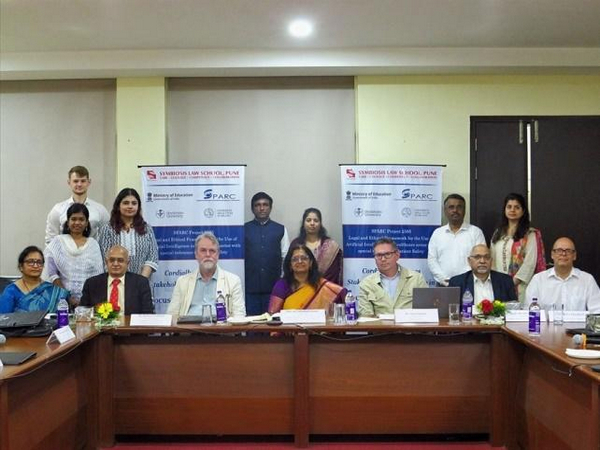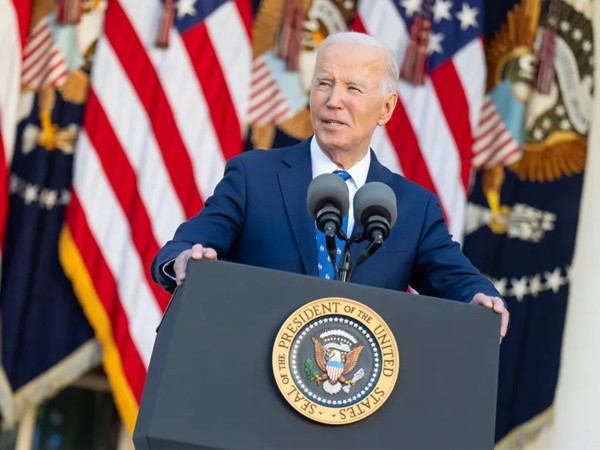Symbiosis Law School, Pune Leads National Dialogue on Healthcare AI Safety Under SPARC Initiative
Oct 21, 2024
SMPL
New Delhi [India], October 21: Symbiosis Law School, Pune (SLS - Pune), a constituent of Symbiosis International (Deemed University) (SIU), under the SPARC Project (2595) 'Legal and Ethical Framework for the use of Artificial Intelligence in Healthcare Sector with special reference to Patient Safety' which is funded by the Ministry of Education, Government of India organised a Focused Group Discussion on the project theme in hybrid mode on 18th October 2024 from 10:30 a.m. to 02:00 p.m.
The welcome address was given by Prof. (Dr.) Shashikala Gurpur, Fulbright Scholar, Director, Symbiosis Law School, Pune, Dean, Faculty of Law, Symbiosis International (Deemed University), Jean Monnet Chair Professor (EUC-LAMP Co-funded by EU), Principal Investigator, SPARC Project. The dignitaries began the focus group discussion after lighting of the auspicious lamp. Dr. Gurpur then elucidated upon the objectives of the Project and expected outcomes.
The Focused Group Discussion was characterised by the coming together of many synergies where several eminent personalities from the fields of medicine, law and technology such as Dr (Lt Col) T. Vijaya Sagar, Dean, Symbiosis Medical College for Women (SMCW), SIU; Dr. Prasad Bhanap, Medical Superintendent, Symbiosis Medical College for Women (SMCW), SIU; Prof. Dr. Arun Jamkar, Surgeon, Distinguished Prof. of SMCW & SUHRC, SIU; Dr. Sangram Jadhav, General Surgery - Professor, SMCW; Dr. Santosh Kakade, Medico Legal Expert and Non-judicial Member of the Maharashtra State Consumer Dispute redressal Forum; Dr. Ravindra Ghooi, Pharmacologist, Medical and Healthcare Ethics Expert; Dr. Jitender Sodhi, Asso. Prof., Department of Hospital, Administration, AIIMS, New Delhi; Dr. Gopal Shah, Neuro Surgeon, Ahmedabad, Member Indian Medical Association (IMA); Dr. Shivkumar Utture, General and Laparoscopic Surgeon, Mumbai, Member IMA; Dr. Nikhil D Datar, Obstetrician and Gynaecologist, Patient Rights Activist; Sumantra Bose, Counsel, Khaitan & Co; Dr. Manjusha Kulkarni, Legal Expert, Ruby Hall Hospital; Dr. Jayant Navarange, Paediatrician, Member IMA; Dr. Subhash Behere Surgeon, IMA; Dr. Pratibha Kane, Anaesthetist, IMA; Dr. Meenakshi Deshpande Obstetrician-Gynaecologist, IMA; Dr. Pallavi Chaudhari, Pathologist SMCW; representing Dr. Kotecha Dean Faculty of Law Symbiosis Institute of Technology (SIT) and Head Symbiosis Centre for Applied Artificial Intelligence (SCAAI) was Dr. Rahee Walimbe of SCAAI and Dr. Deepali Vora, Head Computer Studies and IT, SIT; Dr. Ruchika Kaul-Ganekar, Director, Symbiosis Centre for Research and Innovation (SCRI), SIU; Dr. Claes Granmar, Asso Prof., Law Department, Stockholm University, Sweden; Dr. Henricus Verhagen, Asso Prof., Department of Computer Sciences, Stockholm University, Sweden; Giorgi Parulava, Stockholm University, Sweden; Dr. Angelica Bonfanti, and Dr. Chiara Ragni both Asso Prof. and CO PI for the project from University of Milan, Italy and various other technical experts working on Applications of AI in Healthcare sector.
Prof. (Dr.) Gurpur began her address with the Patient Safety Goals and the various facets that they entail. She further addressed WHO's patient safety rights charter of 2023 which are timely, effective and appropriate care; safe and secure health care facilities; safe health care processes and practices, qualified and competent health workers; safe medical products and their safe and rational use; dignity, respect, non-discrimination, privacy and confidentiality; information, education and supported decision making. She further made references to the NITI Aayog's India's National strategy for AI in 2018 and ICMR Guidelines on the use of AI in Healthcare brought out in 2023. She concluded her address after encapsulating the progress made by India and existing lacunae in the ethical and legal framework for the integration of AI into healthcare.
The comparison was done by Ms. Richa Dwivedi, Assistant Professor, SLS - P. Dr. Rupal Rautdesai, Visiting Professor, SLS - P presented the progress achieved under SPARC Project 2595, and outlined the objectives of the Focused Group Discussion.
Prof. (Dr.) Gurpur moderated and facilitated the entire focus group discussion in a question-wise manner with the relevant questions displayed on a screen along with supporting literature offering insight into the topics addressed by the respective questions. The expert participants of the Focused Group Discussion ardently contributed their professional and practical insight and knowledge to enrich the discussion and make it all the more enlightening.
Dr. Nikhil D Datar, said that, "we are dealing with problems of the future based on today's limited understanding and legal framework". He said that "there is a significant need to change the existing legal framework dealing with AI in the context of patient safety". He also said that, "data collection quality to be ensured for using AI tools in the healthcare sector". He also said that "the reliability of AI tools depends upon use of correct data".
According to Dr. Shivkumar Utture "lots of AI models are trained on skewed datasets". He pointed out that "technology is a good servant but bad master". He further said that "AI is like google doctor, however, complicated situations are always guided by experienced hands".
Dr. Arun Jamkar, gave the gist of the benefits that AI could bring in the healthcare sector, but he also raised the concerns relating to the AI systems such as transparency, accountability, privacy, confidentiality and other ethical issues.
Dr. Santosh Kakade discussed the use of AI in healthcare and the medical negligence perspective. Dr. Ravindra Ghooi discussed the use of AI in drug manufacturing and raised very pertinent questions such as has the use of AI in drug development brought down the cost of medicines and made it more affordable and accessible? Can AI do that?
Dr. Jitender Sodhi of AIIMS, New Delhi, from his experience and observation discussed important aspects of how AI systems could be used to make OPD and Emergency work flows better and result in better outcomes for hospital management.
Dr. Jayant Navarange brought out the concerns from the point of view of data safety, privacy, and accountability when an AI is involved in the healthcare setting.
Dr. Meenakshi Deshpande emphasized how human touch was necessary and that AI cannot replace human touch.
Dr. Pratibha Kane explained in a very lucid manner the current state of technology being used in robotic surgeries and was supportive of the fact that AI systems can reduce human errors in healthcare which may happen due to fatigue, distraction and hurry. However, she also was very concerned about the fact that the machine made the error and in such a case who would be responsible.
The legal experts Dr. Manjusha Kulkarni and Sumantra Bose also gave their insights regarding the policy and law reforms that can be feasible given the current state of the AI use in healthcare.
Dr. Claes Granmar and Dr. Henricus Verhagen along with Dr. Shashikala Gurpur summarized the discussion by reiterating the key challenges faced in the integration of AI into healthcare, and sharing the position in Europe and Sweden specifically which are too facing similar issues of AI integration in their healthcare systems and that there were some aspects being governed under the European Union's Artificial Intelligence Act. 
The Focused Group Discussion was concluded by Prof. (Dr.) Gurpur suggesting a way forward which will require a deeper analysis and investigation to suggest appropriate ethical and policy reforms in India. The outcomes of the Focused Group Discussion will be distilled in a monograph on law reforms and tools for AI in healthcare.
The vote of thanks was delivered by Dr. Aparajita Mohanty, Deputy Director (Academics), SLS - P. The event was coordinated by SLS Pune's SPARC project team consisting of Dr. Rupal Rautdesai, Dr. Atmaram Shelke, Dr. Amol Sapatnekar, Dr. Raj Varma, Prof. Richa Dwivedi, Sangramjit Chavan, Sahiti and Sabrina.
Aspiring candidates can apply for SLS Pune's law programmes via SLAT 2025 by registering before 22nd November 2024 at the official link.
(ADVERTORIAL DISCLAIMER: The above press release has been provided by SMPL. ANI will not be responsible in any way for the content of the same)








